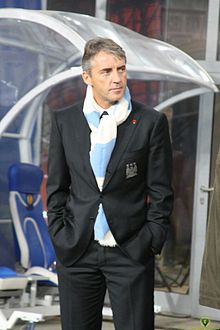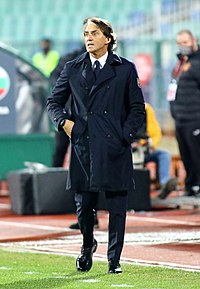Roberto Mancini
[10] With Sampdoria, he formed a dynamic strike partnership with Gianluca Vialli under manager Vujadin Boškov, which earned the pair the nickname The Goal Twins ("I Gemelli del Gol", in Italian).
In David Platt's 1995 autobiography, Achieving the Goal, he described the day he met Sampdoria in Genoa while playing for Bari and, lining up in the tunnel, became aware that Mancini was looking his way.
"[13] Joining Leicester City on loan in January 2001,[14][15] Mancini made his Premier League debut against Arsenal at the age of 36, but failed to complete a full 90 minutes in his five appearances for the club.
[18] He made his international senior squad debut at the age of 19, under Enzo Bearzot, on 26 May 1984, in a 2–0 away win against Canada in Toronto;[6] he later won 36 caps, and scored four goals for his country.
[23] Fierce competition with other creative forwards for places in the starting line-up, such as Gianfranco Zola, Giuseppe Signori, Roberto Baggio and later Francesco Totti and Alessandro Del Piero,[24][25] hindered his international opportunities, hastening his self-imposed exile from the Italy national team.
[26][27][28] Often described as a "fantasista" in the Italian sports media,[29] Mancini was a creative and technically gifted forward, who was frequently deployed as a supporting striker alongside a centre-forward, or, on occasion, as an offensive playmaker in the attacking midfield or trequartista position later on in his career.
As such, he was also capable of operating across the entire front-line, and was even deployed as a centre-forward or out–and–and striker on occasion, due to his movement and intuition, although this was not his favoured position, as he was primarily a generous team player who preferred creating chances for teammates over scoring goals.
[30][34][35][36][37][38][39] Under Eriksson, Mancini was also deployed in a free role as a left winger on occasion, in particular during the 1999–2000 season with Lazio, where he was allowed to drift into the centre to support the main striker, and drop deep to help the team defensively.
[46] Although Mancini had written a research pamphlet entitled "Il Trequartista",[47] which examined the role of an attacking midfielder, he had not as yet attained the necessary coaching badges to become a manager.
Before the start of the 2004–05 season, rumours circulated in the Italian press that Inter Milan had approached Mancini to fill the recently vacated managerial position at the club.
In October and November, the team struggled for form, which put some pressure on Mancini,[73] with his tactics widely criticised following two consecutive 0–0 home draws with Manchester United and Birmingham City.
In the ten games before 15 January 2011, City won seven times, drew twice and lost only once as they moved into title contention, while also securing passage into the Round of 32 of the Europa League by finishing as the top team in Group A.
[76] City was eventually eliminated from the Europa League by Ukrainian side Dynamo Kyiv in March, but his team replied strongly by winning eight out of the next ten matches, including an FA Cup semi-final victory at Wembley over local rivals Manchester United in April.
This FA Cup triumph meant that Mancini joined five other City managers who had won major honours, and it ended the club's longest trophy drought in its history.
Other players purchased during the summer included Gaël Clichy and Stefan Savić, while Owen Hargreaves joined on a free transfer after having been released by Manchester United.
City failed to progress, but finished third in the group with ten points, normally enough to guarantee qualification into the knock-out stages.A 3–2 loss to Manchester United in the FA Cup third round on 8 January 2012 was bittersweet.
On 21 November 2012, a 1–1 draw at home to Real Madrid saw Manchester City and Mancini exit the Champions League at the group stage for the second successive season.
[95][96] With Manchester City, Mancini achieved the fourth-best win percentage in Premier League history, behind only José Mourinho, Alex Ferguson and Carlo Ancelotti.
[101] After a convincing 3–1 victory at home against Copenhagen in the same competition, his Galatasaray side this time defeated reigning Italian champions Juventus 1–0 on the crucial matchday six to advance to the last 16 of the tournament, a feat he was unable to achieve with Manchester City over two seasons.
[102] Under Mancini, Galatasaray won their first 12 2013–14 Süper Lig home matches, including a 6–0 victory over Bursaspor, the highest winning margin in the league as of game week 20.
[106] His first game in charge was against rivals AC Milan in the Derby della Madonnina, which finished in a 1–1 draw, with the club's goal scored by Joel Obi.
[135] Mancini was appointed as head coach of the Saudi Arabia national team on 27 August 2023 on a contract running to 2027,[136][137] and managed the Green Falcons through the 2023 AFC Asian Cup knockout stage, where they lost to South Korea 4–2 on penalties in the round of 16.
On 24 October 2024, Mancini reached a joint agreement with the Saudi Arabian Football Federation to end his contract as national team manager, following disappointing results during the 2026 FIFA World Cup qualification after draws against low-ranked sides Bahrain and Indonesia.
[141][142][143] At Manchester City, Mancini had inherited a team from Mark Hughes, which while showing great prolificity and potential in front of goal, had an insecure defence.
Mancini's players believed his approach alleviated pressure and helped City to win the last six league matches, which won the title on goal difference.
[151] During the period in which he has coached the Italy national team, Mancini has often used a 4–3–3 formation, and has instead developed a reputation for creating a "winning machine" while also playing more attractive, offensive–minded football with a greater emphasis on possession.
[157][158] He has also been known for giving opportunities to young players, with Nicolò Zaniolo and Sandro Tonali given call-ups to the national team even before making their debuts in Serie A.
To the use of foreign-born players, Conte responded: "If Mauro Camoranesi [who was born in Argentina] was allowed to help Italy win the 2006 World Cup, then why can't Éder and Franco Vázquez lead the Azzurri to glory in next year's European Championship?
[167] During the post-match interviews of the same game, he replied harshly and quite rudely to the journalist Mikaela Calcagno, blaming her for asking silly questions ("Questa è una stronzata, dai, su", Italian for "This is crap, come on") and creating controversy ("Se mi deve fare domande per far polemica, la facciamo", Italian for "If you need to ask me questions to create controversy, let’s do it").
Filippo trained with the club's youth/reserve team for several months during the 2007–08 season before Roberto was appointed as City's manager, while Andrea was signed by his father for the Elite Development Squad in November 2010 after being released from Bologna.







